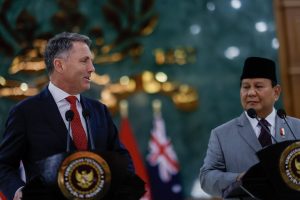Indonesia and Australia yesterday signed a landmark new defense agreement, announcing plans to hold their largest-ever joint military exercise later this year.
The agreement, the fruit of two years of negotiations, was signed by Indonesian Defense Minister Prabowo Subianto and his Australian counterpart Richard Marles at Indonesia’s National Military Academy in Magelang, Central Java province. Both hailed the agreement as a significant upgrade to their military relationship.
In a joint press conference, Prabowo, who will take office as Indonesia’s president in October, described the Australia-Indonesia Defense Cooperation Agreement as a “historic milestone.” While emphasizing that the agreement was not a military alliance, he said it would “increase cooperation to help each other overcome various security threats and promote sustainable peace and stability in the Asia-Pacific region.”
Marles described the agreement as “the most significant defense agreement in the history of our bilateral relationship” and said that it would open the way to “much greater interoperability between our defense forces, an ability to operate from each other’s countries.”
Marles also announced that the two sides will hold what he described as the “biggest bilateral exercise between our two countries.” Known as Chris Woomera, the exercise, which will take place in Surabaya in November, will involve 2,000 personnel from the Australian and Indonesian defense forces. Marles said it would be Australia’s largest overseas exercise of the year. “It’s across the fields of air, land, and sea,” he said. “It’s the most complex exercise that we will have seen.”
Although the full text of the agreement has not yet been released, the pact includes provisions for joint drills and reciprocal access by the Australian and Indonesian militaries to each other’s countries, which will help facilitate more substantial security cooperation. Australia’s defense ministry said the agreement will include “enhanced practical cooperation and interoperability between our defense forces in areas such as maritime security, counter-terrorism, humanitarian and disaster relief, logistics support, education and training, as well as across defense industry.”
Though the details have not yet been released, the Australian Defense Ministry said the agreement will enhance cooperation and interoperability between the two countries’ defense forces in maritime security, logistics support, training, and other areas.
The Australia-Indonesia Defense Cooperation Agreement represents a maturing of the periodically turbulent security partnership between Canberra and Jakarta. It also reflects a growing strategic convergence, particularly regarding the geopolitical turbulence stemming from China. This is also reflected by Indonesia’s willingness to deepen its security engagements with the United States. On August 26, the two nations launched the largest ever iteration of the Super Garuda Shield exercise, along with military personnel from eight other nations, including Australia.
But as I have noted about the agreement previously, Australia and Indonesia have reached the same point via very different paths. Where Australia has responded to China’s growing power by reaffirming its alliance with the U.S. and other U.S. partners like the United Kingdom, Japan, and India, Indonesia has continued to hew to a non-aligned foreign policy doctrine that eschews formal military alliances and emphasizes defense engagements with all of the powers, including those on the “other” side of the global strategic divide. While closer Western security cooperation can help Jakarta balance against China, it seeks to avoid over-reliance on any outside power.
It was perhaps no surprise, as Rahman Yaacob noted this week for the Lowy Institute’s Interpreter blog, that the finalization of the Australia-Indonesia agreement was followed shortly by the announcement that the Indonesian military would conduct a bilateral military exercise with China in 2025. Yaacob described the move as “reflective of Indonesia’s strategic culture” and perhaps a way of “reassuring Beijing that the Australia-Indonesia defense agreement is just business-as-usual as far as Indonesia’s defense diplomacy goes.”
































